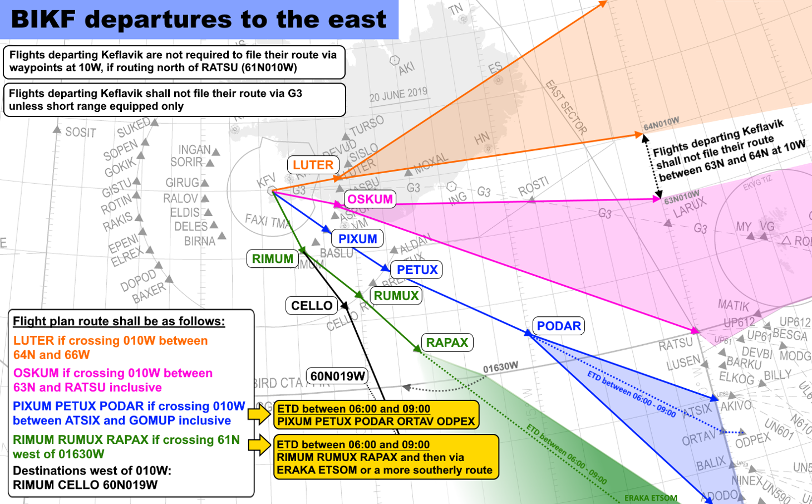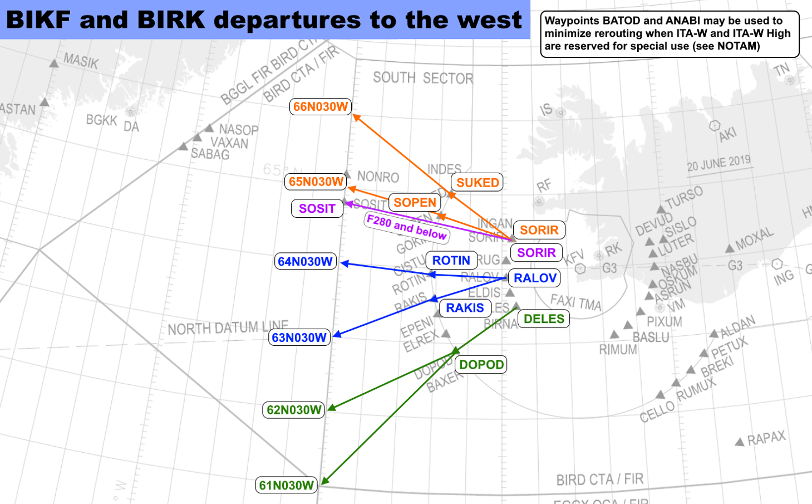Keflavik DEL
Keflavik Delivery (BIKF_DEL) shall provide clearance delivery to departing IFR aircraft.
As of 20th March 2024, all departing aircraft shall receive a standard IFR clearance; no oceanic clearances are to be issued.
Overview of SIDs
All SIDs below require RNAV 1 capability.
|
TERMINATING FIX |
RUNWAY |
|||
|
01 |
10 |
19 |
28 |
|
|
LUTER |
2A |
2B |
3C |
3D |
|
OSKUM |
3A |
1B |
3C |
3D |
|
PIXUM |
1A |
1B |
2C |
2D |
|
RIMUM |
1A |
3B |
1C |
1D |
|
DELES |
2A |
3B |
2C |
3D |
|
SORIR |
3A |
3B |
2C |
2D |
|
RALOV |
3A |
4B |
3C |
1D |
|
Initial Climb: FL290 (or RFL if lower) |
||||
Omnidirectional Departures
Aircraft which are non-RNAV may be cleared on the Omnidirectional (OMNI) departures. There are four OMNI departures – one for each runway. These departures essentially have the aircraft fly runway track to 5000ft, after which they will proceed as instructed by ATC. The initial climb is 5000ft.
|
RWY |
OMNI |
TRK |
|
01 |
4A |
014 |
|
10 |
4B |
104 |
|
19 |
4C |
194 |
|
28 |
4D |
284 |
When assigning an Omnidirectional departure, DEL shall notify APP (no prior approval from APP is required), and change the SID item in the Departure list to the appropriate OMNI SID, overriding Euroscope’s automatic SID selection.
An example of a clearance via an OMNI departure is as follows:
🎧 BAW80KA, cleared to London Heathrow via the Omnidirectional 4A departure, initial climb 5000ft, Mach .78, squawk 4301.
If the pilot appears unfamiliar with the OMNI departures, the alternative phraseology "after departure runway XX fly runway heading" may be used.
Standard Routings for Departures
Iceland AIP ENR 1.8.3.1.3.7 defines standard routing requirements for departures from BIKF. For ease of reference, they are summarized in the following images:
G3 Airway Restriction
For aircraft departing BIKF (and BIRK), the G3 airway is not available, except to aircraft with short-range navigational equipment only (e.g., VOR navigation.)
If an aircraft has filed a flight plan routing via G3, they should be rerouted as per the standard routings above.
Generally speaking, most aircraft may be rerouted from the last waypoint of their SID direct to either LUTER or PIXUM, followed by their final waypoint in the Reykjavik CTA.
For flights remaining in the Reykjavik CTA for their entire flight, such as those going to EKVG, the "final waypoint in the Reykjavik CTA" is simply the final waypoint of their flight plan.
IFR Flights to BIRK
DEL shall coordinate all IFR flights from BIKF to BIRK prior to issuing the clearance. APP should provide either a direct to one of BIRK’s Initial Approach Fixes (IAFs), or radar vectors, as appropriate for the traffic situation. Generally, such flights will rarely climb higher than 5000ft.
Such clearances follow the general format of non-standard clearances (see Delivery SOP page.) For example:
🎧 ICE9302, cleared to Reykjavik, after departure runway 19 proceed direct MIKVU, initial climb 5000ft, squawk 1371.
IFR Circuits/Crosswind Testing
In real life, BIKF is a common destination for aircraft manufacturers to test their aircraft’s heavy crosswind capabilities.
DEL must coordinate all such aircraft with APP prior to issuing any clearance. The flight may be issued a clearance with the clearance limit of “Keflavik,” specifying that the flight is performing IFR circuits (or crosswind testing), with any relevant departure instructions as coordinated with APP. For example:
🎧 BOE1, cleared to Keflavik, IFR circuits, after departure runway 19 climb straight ahead to 5000ft, squawk 1322.


